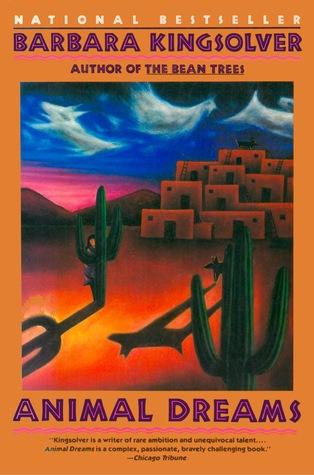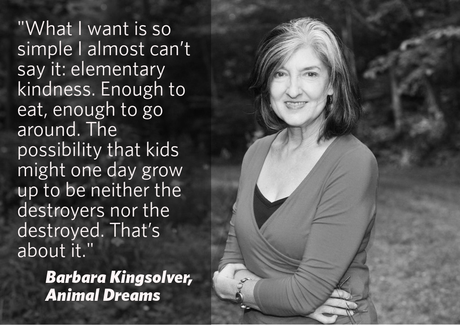I first read this book about 30 years ago when I was in college, and it blew me away. I’ve carried that paperback from house to house for years, but this was the year I picked it back up again. I was nervous I wouldn’t love it the way I did. I definitely experienced it differently, but I wasn’t disappointed.

This is one of Kingsolver’s earliest novels, published in 1990. She lived in Tucson for two decades before moving to Virginia. When I was an English major at the University of Arizona in Tucson, Kingsolver was a celebrated local author. In those days she wrote about the Southwest, much in the way she writes today about Appalachia. As a 20-year-old, I really didn’t want to “limit” myself to reading about the Southwest, but today, I loved revisiting Southern Arizona through her eyes. Kingsolver always writes about nature and wildlife, wherever her books are set.
Codi Noline is in her thirties when she returns, after many years, to her hometown of Grace, Arizona, to care for her aging father. Her sister has gone to Nicaragua to support farming efforts during the upheaval caused by the contras, a rebel army supported by the U.S. government in the 1980s. Codi has a medical education she never completed, and aside from her sister, she isn’t close to anyone, including her father. She didn’t fit in Grace as a child and is sure she won’t fit in now.
In this book, Kingsolver explores both political/government issues and environmental issues, as Codi becomes both a high school science teacher and an unexpected activist. It’s a powerful, dramatic story, and I loved the main character’s strength. I love a good story about sisters, and I also love a good “finding yourself in a small town” story, as I’ve never lived in a small town myself. This is also a homecoming story, about revisiting one’s childhood and seeing it in a new light.
Codi would have seemed old to me at the time I read the book, and now of course she seems young. I think when I was young I saw more of her strengths, and this time I found her heartbreaking. Codi is quick to see her sister as a saint and herself in the worst possible light. She sees herself as ugly, insensitive, uncaring – none of which reflect how she’s actually seen by others. She goes to medical school but decides she doesn’t have the strength to be a doctor. She sees herself as fundamentally unlovable, and like her father, who doesn’t notice that half the women in town are quietly taking care of him, she doesn’t see that there’s a community that loves her. She says the wrong things a lot and keeps people at a distance, but she’s also smart and has strong ideals – she just doesn’t see herself as someone who can help people. I related to her quite a bit.
Throughout the book she discovers that what she understood about herself and her childhood isn’t correct. Kingsolver plays with the idea of memories and how we manipulate or misunderstand them. Codi has blocked a lot of memories or she remembers them wrong, and there are some memories she thinks she’s invented that actually happened. It’s that slippery slope of reality versus perception that’s fascinating to me.

A potential criticism of this book is that Kingsolver is a white writer portraying Native American cultures, and idealizing them to some extent. Her characters are Pueblo, Hopi and Navajo, and I liked the way she explored differences and similarities among them, but I could also see how her native characters, particularly Loyd Peregrina, could be seen as romanticized rather than fully developed.
I remember the cockfighting aspect of the plot to be a much bigger part of the story, and this time it felt resolved rather quickly. Still, I liked the idea of Loyd fighting these two sides of his identity, and he’s clearly leaning in one direction and just needed the push. Loyd does grow in the book but he’s also the “wise man” to Codi’s confusion. Although there are a number of characters, both native and non-native, who play similar roles. I’m not sure I know enough to say whether this is a concern, but I’d be interested to hear others’ views.
If you’re a Kingsolver fan but you haven’t read her earlier Southwest works, I highly recommend this book and The Bean Trees. I feel like these books are sadly under-read, considering how much attention Kingsolver receives as a writer. If you’ve read these books, let me know what you thought of them. I could understand where they might not seem as complex as Demon Copperhead or Flight Behavior, but I love them as they represent a place I’m from and were my first introduction to Kingsolver.

